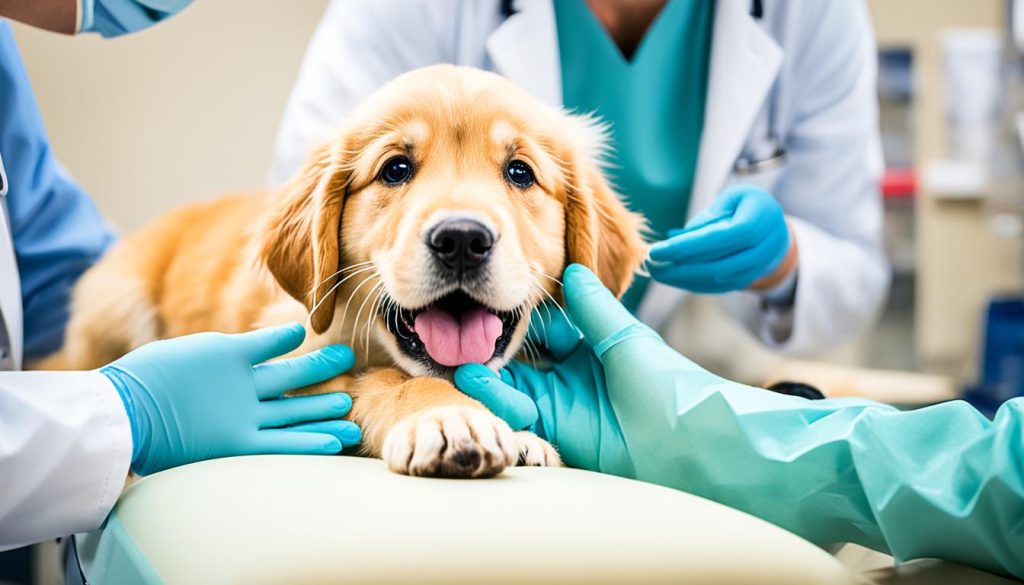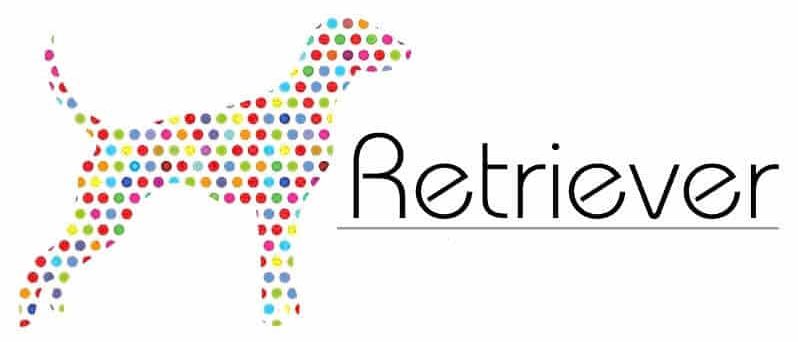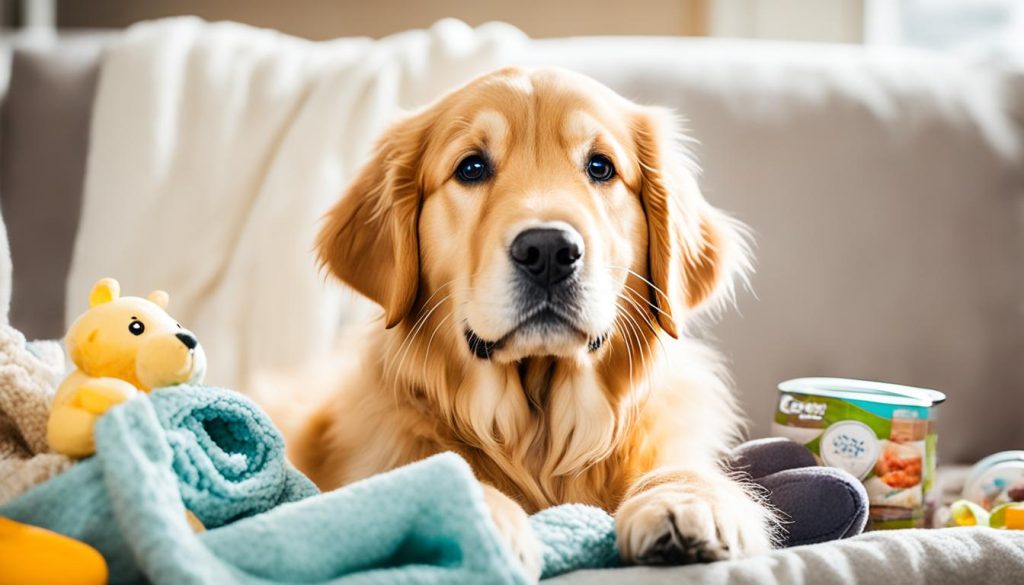Introducing a baby golden retriever into your household epitomises the essence of canine caregiving, enriched with unbounded vigour and love. This breed, marked by its amiable nature and luxurious golden fur, demands tailored care for optimal development. It’s imperative for owners to familiarise themselves with vital care strategies specific to golden retriever puppies. Doing so ensures their new companion flourishes. Initiating grooming routines specific to their dense coats and conducting early health examinations are foundational measures for a prosperous future together.
Implementing delightful canine care tips for your golden puppy not only cultivates a nurturing habitat but also solidifies the relationship with your evolving animal companion. Maintaining your baby golden retriever’s well-being revolves around a core of affection, empathy, and vigilant oversight. Commencing this journey armed with precise knowledge assists in steering through the lively, at times arduous, yet consistently enriching experience of rearing a golden retriever puppy.
Key Takeaways
- Understanding the breed-specific needs of a baby golden retriever is essential for their overall well-being.
- Establishing a grooming routine is vital due to their unique coat requirements.
- Early veterinary health checks are imperative for preventative care and overall health monitoring.
- Integrating adorable dog care tips into daily routines strengthens the bond with your pet.
- Being proactive with a baby golden retriever’s care ensures a fulfilling and joyful companionship.
Nutrition: Nurturing Your Golden Retriever Puppy
Providing your golden retriever puppy with superior cute puppy nutrition is crucial for their growth into a healthy and happy adult. The vast availability of dog foods creates a challenge in identifying an appropriate golden retriever puppy diet. It’s essential to match their diet closely with their energetic and developmental needs.

Choosing the Right Puppy Food
Exploring the plethora of food options requires a focus on breed-specific nutritional needs of golden retrievers. Selecting foods with high-quality proteins, fats, and carbohydrates is paramount. Additionally, ensuring the diet is enriched with vital vitamins and minerals, supports the intense growth and activity levels of the breed.
Understanding Portion Sizes and Feeding Frequency
It is critical to find the right equilibrium in portion size and feeding times to prevent obesity and achieve growth targets. As the puppy ages, adjustments to the amount of food and feeding schedule are necessary. Experts often recommend scheduled feeding to manage the pup’s energy levels and digestive well-being. Incorporating a mix of wet and dry foods can enrich the diet and enhance water intake.
| Age (Months) | Portion Size (cups) | Meals per Day |
|---|---|---|
| 2-4 | 1/2 – 1 1/3 | 4 |
| 4-6 | 1 1/3 – 2 1/4 | 3 |
| 6-12 | 2 1/4 – 3 1/3 | 2 |
The Importance of Clean Water
Alongside a well-balanced golden retriever puppy diet, constant access to clean water is vital. Owners must ensure the puppy’s water bowl is frequently refilled to promote regular drinking. Proper hydration aids in numerous bodily functions, such as digestion and maintaining body temperature. This becomes even more important in hot climates or for puppies primarily eating dry food.
Health Care Considerations for Your Baby Golden Retriever
Ensuring the baby golden retriever health is a matter of great importance. It lays the foundation for their well-being and joy. A comprehensive understanding of puppy veterinary care dramatically influences their longevity and life quality. Within their first months, vigilant monitoring and preventive actions are essential.
With a strong initial focus on furry friend wellness, the health care journey for your Golden begins. This includes administering vital vaccinations against common, dangerous illnesses. Adhering to a schedule recommended by your vet for these vaccinations is critical. Equally, deworming is indispensable due to the susceptibility of puppies to harmful parasites.
Early detection of typical Golden Retriever health issues is crucial. Owners must be capable of identifying symptoms such as lethargy, decreased appetite, or strange behaviour. These may hint at underlying health problems. Prompt action could drastically alter the prognosis of various conditions.
- Vaccination Schedule
- Deworming Programmes
- Regular Check-ups
Enhance your commitment to your pet’s health through pet health insurance. It offers a buffer against sudden veterinary costs, guaranteeing access to the highest standard of care.
In the face of health issues or emergencies, understanding when to consult a vet is crucial. Establishing a bond with a trusted veterinarian, especially one with a background in Golden Retrievers, is paramount for superior care.

Training and Socialising Your Baby Golden Retriever
Instilling refined manners and social abilities in a baby golden retriever is essential for its maturation into a disciplined companion. The combination of effective training and meticulously conducted socialisation eradicates adverse behaviours, enhancing their inherently genial dispositions.
House Training Basics
Initiating house training at a tender age is pivotal in shaping the behaviour of a golden retriever puppy. Utilising crate training forms a cornerstone of this endeavour, providing puppies with their own space, thereby facilitating environmental control and reducing mishaps. A regular schedule for toilet breaks not only upholds cleanliness but also cements desirable habits deeply.
Teaching Basic Commands
Introducing fundamental commands such as ‘sit’, ‘stay’, and ‘come’ is instrumental in establishing discipline and strengthening the owner-pet relationship. Consistent training of these commands asserts the owner’s leadership while fostering a pet that is both obedient and receptive.
| Command | Description | Benefits |
|---|---|---|
| ‘Sit’ | Teaches the puppy to sit on command. | Instils impulse control and prepares for calm interactions. |
| ‘Stay’ | Encourages the puppy to remain stationary until released. | Enhances patience and response to owner’s guidance. |
| ‘Come’ | Calls the puppy back to the owner reliably. | Crucial for safety and managing off-leash situations. |
Socialising Your Puppy with Humans and Other Dogs
The value of early socialisation in golden retrievers is paramount; experiencing diverse human and canine interactions broadens their social understanding, reducing potential aggression or fear. A puppy well versed in these interactions displays adaptable, enjoyable behaviours, appreciated universally.
- Early exposure to friendly individuals across a spectrum of ages and cultures.
- Meetings with other immunised dogs in safe settings.
- Participation in puppy classes for organised socialisation and education.
Through diligent and regular training and socialisation efforts, owners will craft golden retriever puppies into sociable, balanced companions, enthusiastic about engaging with their surroundings optimistically.
Conclusion
Raising a baby golden retriever transcends simple shelter and nourishment. It necessitates a nurturing ethos, embracing comprehensive principles of nutrition, health, and training. Owners must perceive the significant dedication needed for their puppy’s development into a joyful, well-balanced companion. By meticulously managing each growth stage, from selecting proper nutrition to implementing a comprehensive vaccination plan and fostering social interactions, owners lay the foundation for a fulfilling relationship based on mutual respect and affection.
The role of a pet dog within a family surpasses mere ownership, evolving into a bond of lifelong companionship, marked by unconditional love and happiness. The critical nature of the adorable dog care tips presented herein significantly influences these canines’ life and temperament. As they mature, their needs and behaviours will reflect the early efforts put into their care, underlining the importance of those initial stages of companionship.
The joy of rearing a baby golden retriever manifests in endless wagging tails, warm nuzzles, and an irreplaceable connection with its family. This journey engraves indelible memories and forges a unique companionship between humans and their devoted canine friends. It is hoped this guide will light the way for those commencing the rewarding journey of bringing up a golden retriever puppy as a valued family member.
FAQ
What are the essential care tips for a baby golden retriever pup?
Caring for a baby golden retriever necessitates regular health check-ups and a nutritional diet designed for their developmental stage. Their coat requires meticulous grooming. It is also fundamental to initiate training and socialisation early on.
How should I choose the right food for my golden retriever puppy?
Choosing the right food entails selecting a high-quality puppy diet that meets the elevated energy requirements of golden retrievers. This diet should comprise a precise mix of proteins, carbohydrates, fats, vitamins, and minerals. Veterinary advice can confirm if the diet aligns with your puppy’s unique needs.
What are the recommended portion sizes and feeding frequencies for a golden retriever pup?
Recommended portion sizes and feeding frequencies vary with the puppy’s age, size, and activity level. Typically, puppies need 3 to 4 small meals daily. Adhering to the feeding guidelines provided by the food manufacturer and adapting based on veterinary advice is crucial.
Why is access to clean water essential for my puppy’s health?
Access to clean water is essential for a puppy’s hydration, which is vital for their overall wellbeing. It supports digestion, the absorption of nutrients, and helps regulate body temperature. Fresh, uncontaminated water must be constantly available to your golden retriever puppy.
What health care considerations are important for a baby golden retriever?
Essential health care for a golden retriever puppy includes routine immunisation, frequent deworming, prompt detection of common diseases, and acquiring health insurance to cover unforeseen veterinary costs.
When should I begin training and socialising my golden retriever puppy?
Initiating training and socialisation should occur immediately upon the puppy’s arrival at home. The critical period for socialisation is between 3 to 14 weeks. Start with basic commands and consistently implement house training and socialisation in a positive manner.
How can I ensure I am raising a healthy and happy baby golden retriever?
Ensuring a golden retriever puppy’s health and happiness involves a blend of adequate care strategies. This includes providing suitable nutrition, ensuring regular veterinary care, applying consistent training with positive reinforcement, and offering ample love and companionship.

